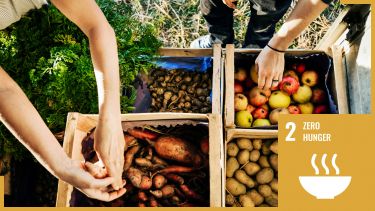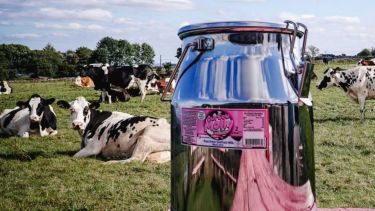SDG2: Zero Hunger
At Sheffield we are striving to support goal two both locally and globally, by increasing the access to affordable food for as many people as possible.

Key facts for how we are achieving SDG2
- All food waste from our commercial outlets and student residences is sent for anaerobic digestion. We work with student groups to redistribute edible food, meaning food waste from our outlets equates to only 920g per staff member and student per year
- Ground breaking research and innovation at the Institute of Sustainable Food
- University and student based initiatives to reduce food insecurity
- Community Fridges to help reduce food waste an ensure donations to students and the local community
- Working directly with our coffee growings in Columbia to ensure fair price and working conditions
Across the planet there are 2 billion people who are chronically hungry. That’s over a third of the world. The COVID-19 crisis has pushed those rising rates even higher. The war in Ukraine is further disrupting global food supply chains and creating the biggest global food crisis since World War II.
At Sheffield, we are using our research expertise to help find dynamic solutions to the challenges of food security and sustainability, as well as working locally to help those facing food poverty.
Research
Institute for Sustainable Food
The Institute for Sustainable Food finds dynamic solutions to the challenges of food insecurity and sustainability. Their fields of research include science, engineering, social sciences, and arts and humanities.
Leverhulme Centre for Climate Change Mitigation
Scientists from Leverhulme Centre for Climate Change Mitigation, who are affiliated with the Institute for Sustainable Food and Energy Institute, used the University's world-class controlled environment facility to research how rock dust helps soils store carbon and boosts crop yields.
It is thought that adding rock dust to crops could contribute significantly to mitigate the climate crisis, improve food and soil security, and cut farmers’ costs. Learn more here.
Local food, Covid-19 and the future of the UK’s food systems
The local food sector came into focus during the Covid-19 pandemic as the UK’s mainstream food systems experienced shocks and shifts. This project examines this period and shows how we can enhance the resilience of the local food sector and of the wider food system in the UK. The pandemic not only substantiated the importance of the local food sector, it also provided an opportunity to envision a food systems transformation centred on strengthening local food systems. Research in this area can help improve levels of food security so more people can gain access to food.
Find out more about the project
Urban horticulture
Academics from the Institute for Sustainable Food have found that growing fruit and vegetables in just 10% of a city’s garden and other urban green spaces could provide 15% of the local population with their ‘five a day’; the equivalent of 90,000 people in Sheffield.
Find out more about the research
Feeding the world with climate-ready rice
Scientists from the Institute for Sustainable Food have been researching ways to help rice plants cope with a more extreme climate
Find out more about the research
Campus
Zero waste shop
Another innovative initiative from Sheffield Students Union is its Zero Waste Shop. This shop demonstrates the ways in which consumers can ethically and sustainably live their lives. It has numerous foodstuffs available free of packaging from rice and pasta through to various herbs and spices. Staff and students can also purchase reusable coffee cups, refill washing up liquid and even dip into vegan pick and mix.
Community fridges
The 3 x Community Fridges of the University of Sheffield are located in the Edge (Endcliffe) which was launched in January 2017, the Ridge (Ranmoor) in February 2020 and more recently in the Students Union (September 2023).
Partnerships
Our Cow Molly
We’ve been working with Our Cow Molly, the last dairy farm in Sheffield that processes and bottles its own milk, since 2010. Our Cow Molly supplies all of the University’s cafes, hotels, conferencing and catering services with fresh milk from its dairy only four miles from campus. As a result of the agreement with the University, Our Cow Molly has been able to borrow and invest in a new state-of-the-art dairy and secure a sustainable supply of milk to the University and to Sheffield as a whole.
The project will remove 27,000 single-use plastic bottles per year in the initial trial and a further 60,000 once rolled out across all of the University’s cafes. The switch to churns will also cut the carbon footprint of milk delivery to the University by over 65 percent - equivalent to 6.5 tonnes of CO2 every year.

